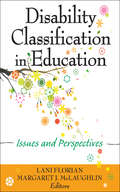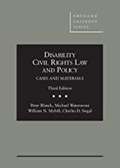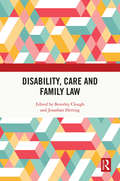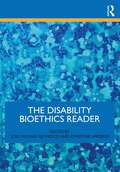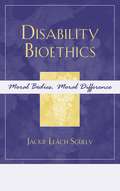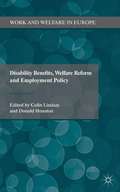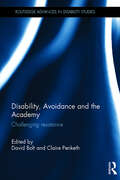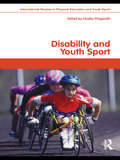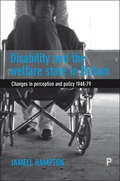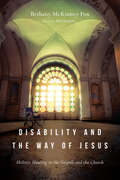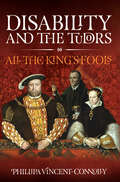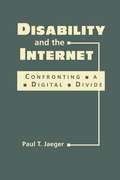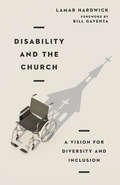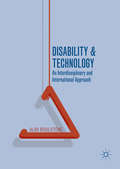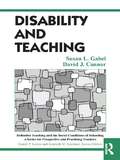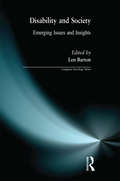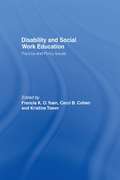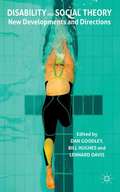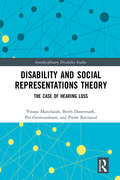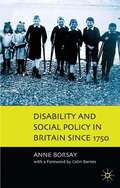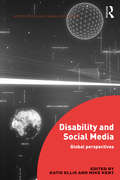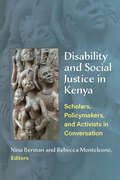- Table View
- List View
Disability Classification in Education: Issues and Perspectives
by Margaret J. McLaughlin Lani FlorianThis edited volume examines current disability classification systems, the dilemmas educators face in categorizing students with special needs, and alternative options based on recent challenges and trends.
Disability Civil Rights Law And Policy, Cases And Materials (American Casebook)
by Peter Blanck Michael Waterstone William N. Myhill Charles D. SiegalThis casebook examines the development of disability rights law and policy in the United States and abroad and can be used as either a law or graduate school teaching tool. It gives a complete and current treatment of the Americans with Disabilities Act and the ADA Amendments Act, including the background of the statute's passage, definition of disability, discrimination in employment, public services, and public accommodations. It also gives in-depth coverage of other important federal disability discrimination statutes like the Individuals with Disabilities Education Act, Rehabilitation Act, and Fair Housing Amendments Act. This book is unique in that it offers extensive coverage of the rapidly developing area of international disability law, through discussion of the new UN Convention on Rights of Persons with Disabilities and related developments. The authors also offer detailed coverage of current policy issues involving taxation, health policy, and technology. The book has been streamlined significantly since the last edition.
Disability, Care and Family Law
by Jonathan Herring Beverley CloughThis book explores the series of issues that emerge at the intersection of disability, care and family law. Disability studies is an area of increasing academic interest. In addition to a subject in its own right, there has been growing concern to ensure that mainstream subjects diversify and include marginalised voices, including those of disabled people. Family law in modern times is often based on an "able-bodied autonomous norm" but can fit less well with the complexities of living with disability. In response, this book addresses a range of important and highly topical issues: whether care proceedings are used too often in cases where parents have disabilities; how the law should respond to children who care for disabled parents – and the care of older family members with disabilities. It also considers the challenges posed by the UN Convention on the Rights of Persons with Disabilities, particularly around the different institutional and state responsibilities captured in the Convention, and around decision-making for both disabled adults and children. This interdisciplinary collection – with contributors from law, criminology, sociology and social policy as well as from policy and activist backgrounds – will appeal to academic family lawyers and disability scholars as well as students interested in issues around family law, disability and care.
The Disability Bioethics Reader
by Joel Michael Reynolds Christine WieselerThe Disability Bioethics Reader is the first introduction to the field of bioethics presented through the lens of critical disability studies and the philosophy of disability. Introductory and advanced textbooks in bioethics focus almost entirely on issues that disproportionately affect disabled people and that centrally deal with becoming or being disabled. However, such textbooks typically omit critical philosophical reflection on disability. Directly addressing this omission, this volume includes 36 chapters, most appearing here for the first time, that cover key areas pertaining to disability bioethics, such as: state-of-the-field analyses of modern medicine, bioethics, and disability theory health, disease, and the philosophy of medicine issues at the edge- and end-of-life, including physician-aid-in-dying, brain death, and minimally conscious states enhancement and biomedical technology invisible disabilities, chronic pain, and chronic illness implicit bias and epistemic injustice in health care disability, quality of life, and well-being race, disability, and healthcare justice connections between disability theory and aging, trans, and fat studies prenatal testing, abortion, and reproductive justice. The Disability Bioethics Reader, unlike traditional bioethics textbooks, also engages with decades of empirical and theoretical scholarship in disability studies—scholarship that spans the social sciences and humanities—and gives serious consideration to the history of disability activism.
Disability Bioethics: Moral Bodies, Moral Difference
by Jackie Leach ScullyJackie Leach Scully argues that bioethics cannot avoid the task of considering the moral meaning of disability in humans--beyond simply regulating reproductive choices or new areas of biomedical research. By focusing on the experiential and empirical reality of impairment and drawing on recent work in disability studies, Scully brings new attention to complex ethical questions surrounding disability. Impairment is variously considered as a set of social relations and practices, as experienced embodiment, as an emancipatory movement, and as a biomedical phenomenon. In this way, disability is joined to the general late-twentieth-century trend of attending to difference as a significant and central axis of subjectivity and social life.
Disability Benefits, Welfare Reform and Employment Policy
by Colin Lindsay Donald HoustonThis book aims to tackle the issues that are central to understanding and addressing one of the most important employment policy problems facing governments in the UK and beyond: the high number of people of working age claiming 'disability' or 'incapacity' benefits.
Disability, Avoidance and the Academy: Challenging Resistance (Routledge Advances in Disability Studies)
by David Bolt Claire PenkethDisability is a widespread phenomenon, indeed a potentially universal one as life expectancies rise. Within the academic world, it has relevance for all disciplines yet is often dismissed as a niche market or someone else’s domain. This collection explores how academic avoidance of disability studies and disability theory is indicative of social prejudice and highlights, conversely, how the academy can and does engage with disability studies. This innovative book brings together work in the humanities and the social sciences, and draws on the riches of cultural diversity to challenge institutional and disciplinary avoidance. Divided into three parts, the first looks at how educational institutions and systems implicitly uphold double standards, which can result in negative experiences for staff and students who are disabled. The second part explores how disability studies informs and improves a number of academic disciplines, from social work to performance arts. The final part shows how more diverse cultural engagement offers a way forward for the academy, demonstrating ways in which we can make more explicit the interdisciplinary significance of disability studies – and, by extension, disability theory, activism, experience, and culture. Disability, Avoidance and the Academy: Challenging Resistance will interest students and scholars of disability studies, education studies and cultural studies.
Disability and Youth Sport (Routledge Studies in Physical Education and Youth Sport)
by Hayley FitzgeraldHow can or does youth sport reconcile what seems to be a fundamental contradiction between understandings of sport and disability? Has youth sport been challenged in anyway? Have alternative views of sport for disabled people been presented? Examining some of the latest research, this book considers the relationship between sport and disability by exploring a range of questions such as these. Disability and Youth Sport further challenges current thinking and therefore serves to stimulate progressive debate in this area. Drawing on a breadth of literature from sports pedagogy, sociology of sport, disability studies, inclusive education, and adapted physical activity, a socially critical dialogue is developed where the voices of young disabled people are central. Topics covered include: researching disability and youth sport inclusion policy towards physical education and youth sport constructions of disability through youth sport the voices of young disabled people the historical context of disability sport With its comprehensive coverage and expert contributors from around the globe, this book is an ideal text for students at all levels with an interest in youth sport, disability studies, or sport policy.
Disability and the Welfare State in Britain: Changes in Perception and Policy 1948–79
by Jameel HamptonCreated during and after the Second World War, the British Welfare State seemed to promise welfare for all, but, in its original form, excluded millions of disabled people. This book examines attempts in the subsequent three decades to reverse this exclusion. It is the first to contextualise disability historically in the welfare state and under each government of the period. It looks at how disability policy and perceptions were slow to change as a welfare issue, which is very timely in today’s climate of austerity. It also provides the first major analysis of the Disablement Income Group, one of the most powerful pressure groups in the period and the 1972 Thalidomide campaign and its effect on the Heath government. Given the recent emergence of the history of disability in Britain as a major area of research, the book will be ideal for academics, students and activists seeking a better understanding of the topic.
Disability and the Way of Jesus: Holistic Healing in the Gospels and the Church
by Bethany McKinney FoxWhat does healing mean for people with disabilities? The Gospels are filled with accounts of Jesus offering physical healing. But even as churches today seek to follow the way of Jesus, people with disabilities all too often experience the very opposite of healing and life-giving community: exclusion, judgment, barriers. Misinterpretation and misapplication of biblical healing narratives can do great damage, yet those who take the Bible seriously mustn't avoid these passages either. Bethany McKinney Fox believes that Christian communities are better off when people with disabilities are an integral part of our common life. In Disability and the Way of Jesus, she considers how the stories of Jesus' healings can guide us toward mutual thriving. How did Jesus' original audience understand his works of healing, and how should we relate to these texts today? After examining the healing narratives in their biblical and cultural contexts, Fox considers perspectives from medical doctors, disability scholars, and pastors to more fully understand what Jesus does as he heals and how he points the way for relationships with people with disabilities. Personal reflections from Christians with disabilities are featured throughout the book, which concludes with suggestions for concrete practices adaptable to a variety of church settings. Bridging biblical studies, ethics, and disability studies with the work of practitioners, Fox provides a unique resource that is both theologically grounded and winsomely practical. Disability and the Way of Jesus provides new lenses on holistic healing for scholars, laypeople, and ministry leaders who care about welcoming all people as Jesus would.
Disability and the Tudors: All the King's Fools
by Phillipa Vincent ConnollyThroughout history, how society treated its disabled and infirm can tell us a great deal about the period. Challenged with any impairment, disease or frailty was often a matter of life and death before the advent of modern medicine, so how did a society support the disabled amongst them? For centuries, disabled people and their history have been overlooked - hidden in plain sight. Very little on the infirm and mentally ill was written down during the renaissance period. The Tudor period is no exception and presents a complex, unparalleled story. The sixteenth century was far from exemplary in the treatment of its infirm, but a multifaceted and ambiguous story emerges, where society’s ‘natural fools’ were elevated as much as they were belittled. Meet characters like William Somer, Henry VIII’s fool at court, whom the king depended upon, and learn of how the dissolution of the monasteries contributed to forming an army of ‘sturdy beggars’ who roamed Tudor England without charitable support. From the nobility to the lowest of society, Phillipa Vincent-Connolly casts a light on the lives of disabled people in Tudor England and guides us through the social, religious, cultural, and ruling classes’ response to disability as it was then perceived.
Disability and the Muslim Perspective: An Introduction for Rehabilitation and Health Care Providers
by Rooshey Hasnain Laura Cohon Shaikh Hasan ShanawaniThis publication will fill a void in the literature on disability intended for use by rehabilitation and health care professionals. We highlight both the difficulties and successes that Muslims with disabilities experience as they seek access to the opportunity to live a meaningful life. The growing number and diversity of Muslims in the United States challenges disability and health care providers and researchers to understand this population's perspectives, experiences and ways of practicing Islam, particularly relative to health care, disability and rehabilitation.
Disability and the Internet
by Paul T. JaegerFrom websites to mobile devices, cyberspace has revolutionized the lived experience of disability, frequently for better, but sometimes for worse. Paul Jaeger offers a sweeping examination of the complex and often contradictory relationships between people with disabilities and the Internet. Tracing the historical and legal evolution of the digital disability divide in the realms of education, work, social life, and culture, and also exploring avenues of policy reform and technology development, Jaeger connects individual experiences with the larger story of technology¿s promise and limitations for providing equal access online.
Disability and the Good Human Life
by Jerome E. Bickenbach Franziska Felder Barbara Schmitz Jerome E. Bickenbach Franziska FelderThis collection of original essays, from both established scholars and newcomers, takes up a recent debate in philosophy, sociology, and disability studies on whether disability is intrinsically a harm that lowers a person's quality of life. While this is a new question in disability scholarship, it also touches on one of the oldest philosophical questions: what is the good human life? Historically, philosophers have not been interested in the topic of disability, and when they are it is usually only in relation to questions such as euthanasia, abortion, or the moral status of disabled people. Consequently disability has been either ignored by moral and political philosophers or simply equated with a bad human life, a life not worth living. This collection takes up the challenge that disability poses to basic questions of political philosophy and bioethics, among others, by focusing on fundamental issues and practical implications of the relationship between disability and the good human life.
Disability and the Church: A Vision for Diversity and Inclusion
by Lamar HardwickLamar Hardwick was thirty-six years old when he found out he was on the autism spectrum. While this revelation helped him understand and process his own experience, it also prompted a difficult re-evaluation of who he was as a person. And as a pastor, it started him on a new path of considering the way disabled people are treated in the church. Disability and the Church is a practical and theological reconsideration of the church's responsibilities to the disabled community. Too often disabled persons are pushed away from the church or made to feel unwelcome in any number of ways. As Hardwick writes, "This should not be." He insists that the good news of Jesus affirms God's image in all people, and he offers practical steps and strategies to build stronger, truly inclusive communities of faith.
Disability and Technology
by Alan RoulstoneThis book brings together formally disparate literatures and debates on disability and technology in a way that captures the complex interplay between the two. Drawing on disability studies, technology studies and clinical studies, the book argues that interdisciplinary insights together provide a more nuanced and less stylized picture of the benefits and barriers in disability and technology. Drawing on a breadth of empirical studies from across the globe, a picture emerges of the complex and multi-directional interplay of technology and disability. Technology is neither inherently enabling or disabling but fundamentally shaped by the social dynamics that shape their design, use and impact.
Disability and Teaching (Reflective Teaching and the Social Conditions of Schooling Series)
by David Connor Susan GabelDisability and Teaching highlights issues of disability in K-12 schooling faced by teachers, whoare increasingly accountable for the achievement of all students regardless of the labelsassigned to them. It is designed to engage prospective and practicing teachers in examining theirpersonal theories and beliefs about disability and education. Part I offers four case studies dealing with issues such as inclusion, over-representation inspecial education, teacher assumptions and biases, and the struggles of novice teachers. Thesecases illustrate the need to understand disability and teaching within the contexts of school,community, and the broader society and in relation to other contemporary issues facing teachers.Each is followed by space for readers to write their own reactions and reflections, educators’dialogue about the case, space for readers’ reactions to the educators’ dialogue, a summary, andadditional questions. Part II presents public arguments representing different views about thetopic: conservative, liberal-progressive, and disability centered. Part III situates the authors’personal views within the growing field of Disability Studies in education and provides exercisesfor further reflection and a list of resources. Disability and Teaching is the 8th volume in the Reflective Teaching and the Social Conditions ofSchooling Series, edited by Daniel P. Liston and Kenneth M. Zeichner. This series of small,accessible, interactive texts introduces the notion of teacher reflection and develops it in relationto the social conditions of schooling. Each text focuses on a specific issue or content area inrelation to teaching and follows the same format. Books in this series are appropriate for teachereducation courses across the curriculum.
Disability and Special Needs
by Dolly SinghThis publication titled "Disability and Special Needs: Dimensions and Perspectives", provides readers with an understanding of disability in a wider perspective, including details about dimensions; key facts; global classification; etc.
Disability and Society: Emerging Issues and Insights (Longman Sociology Series)
by Len BartonThe study of disability has traditionally been influenced mainly by medical and psychological models. The aim of this new text, Disability and Society, is to open up the debate by introducing alternative perspectives reflecting the increasing sociological interest in this important topic.Disability and Society brings together for the first time some of the most recent original research in this rapidly expanding area. The contributors, both disabled and non-disabled, are all leading thinkers in their field and suggest new ways of understanding disability, developing policy and challenging current practice.
Disability and Social Work Education: Practice and Policy Issues
by Francis K. O. Yuen Carol B. Cohen Kristine TowerBridging the chasm between the disabled and a just and fair society takes skill, dedication, and a deep understanding of the issues. Disability and Social Work Education: Practice and Policy Issues presents leading social work experts providing insightful, effective strategies to address the current gaps in the system between social work and those individuals with disabilities. Diverse perspectives on all levels of social work practice are integrated with the basic tenets of social justice, accessibility to services, and human rights. Specific challenges and issues are addressed in work with disabled populations. Disability and Social Work Education: Practice and Policy Issues examines the social construction of disability that connotes inferiority and highlights practical strategies for change. This creative resource gives social work educators, students, and practitioners the opportunity to embrace diverse and creative ways for integrating a generalist social work model in their work with various size systems that are related to disability. Chapters include extensive references, appendixes, tables, and figures to clearly illustrate topics. Topics in Disability and Social Work Education: Practice and Policy Issues include: model curriculum on disabilities that incorporates diverse perspectives of social work practice with individuals who have physical, cognitive, and psychiatric disabilities protecting the legal rights of children and the Individuals with Disabilities Education Act (IDEA) empowering disabled individuals for civil rights to have access to community living the academic process of helping students who are disabled achieve their academic goals components of the Americans with Disabilities Act—and key decisions made by the Supreme Court strategies of intervention for macro change historical overview of family policy and practice as it relates to children and adolescents who are disabled the biopsychosocial framework as an assessment tool to develop interventions the use of the therapeutic relationship and psychodynamic and ecological approaches to social work practices helping clients with disabilities develop adaptive religious and spiritual beliefs disability protests and movements and their implications on social work practice the Capacity Approach and the International Classification of Functioning, Disability and Health as social work tools basic guidelines for undertaking research about and with people who have disabilities Disability and Social Work Education: Practice and Policy Issues is a valuable, unique resource for social work educators, students, and practitioners.
Disability and Social Theory
by Dan Goodley Bill Hughes Lennard DavisThis comprehensive, interdisciplinary collection, examines disability from a theoretical perspective, challenging views of disability that dominate mainstream thinking. Throughout, social theories of disability intersect with ideas associated with sex/gender, race/ethnicity, class and nation.
Disability and Social Representations Theory: The Case of Hearing Loss (Interdisciplinary Disability Studies)
by Berth Danermark Vinaya Manchaiah Per Germundsson Pierre RatinaudDisability and Social Representations Theory provides theoretical and methodological knowledge to uncover the public perception of disabilities. Over the last decade there has been a significant shift from body to environment, and the relation between the two, when understanding the phenomenon of disabilities. The current trend is to view disabilities as the outcome of this interaction; in short from a biopsychosocial perspective. This has called for research based on frameworks that incorporate both the body and the environment. There is a great corpus of knowledge of the functions of a body, and a growing corpus of environmental factors such as perceptions among specific groups of persons towards disabilities. However, there is a lack of knowledge of the perception of disabilities from a general population. This book offers an insight into how we can broaden our understanding of disability by using Social Representations Theory, with specific examples from studies on hearing loss. The authors highlight that attitudes and actions are outcomes of a more fundamental disposition (i.e., social representation) towards a phenomenon like disability. This book is written assuming the reader has no prior knowledge of Social Representations Theory. It will be of interest to all scholars, students and professionals working in the fields of disability studies, health and social care, and sociology.
Disability and Social Policy in Britain Since 1750: A History of Exclusion
by Anne BorsayThis book explores experiences of physical and mental impairment in Britain since the Industrial Revolution. The book's starting point is the exclusion of disabled people from the full rights of citizenship because of their marginality to the labor market. Institutional living and community care are then examined with reference to the changing mixed economy of health and social care. Literary, oral and visual sources complement documentary evidence, and particular attention is paid to the personal testimonies of disabled people.
Disability and Social Media: Global Perspectives (500 Tips)
by Katie Ellis Mike KentSocial media is popularly seen as an important media for people with disability in terms of communication, exchange and activism. These sites potentially increase both employment and leisure opportunities for one of the most traditionally isolated groups in society. However, the offline inaccessible environment has, to a certain degree, been replicated online and particularly in social networking sites. Social media is becoming an increasingly important part of our lives yet the impact on people with disabilities has gone largely unscrutinised. Similarly, while social media and disability are often both observed through a focus on the Western, developed and English-speaking world, different global perspectives are often overlooked. This collection explores the opportunities and challenges social media represents for the social inclusion of people with disabilities from a variety of different global perspectives that include Africa, Arabia and Asia along with European, American and Australasian perspectives and experiences.
Disability and Social Justice in Kenya: Scholars, Policymakers, and Activists in Conversation
by Nina Berman Rebecca MonteleoneDisability in Africa has received significant attention as a dimension of global development and humanitarian initiatives. Little international attention is given, however, to the ways in which disability is discussed and addressed in specific countries in Africa. Little is known also about the ways in which persons with disabilities have advocated for themselves over the past one hundred years and how their needs were or were not met in locations across the continent. Kenya has been on the forefront of disability activism and disability rights since the middle of the twentieth century. The country was among the first African states to create a legal framework addressing the rights of persons with disabilities, namely the Persons with Disabilities Act of 2003. Kenya, however, has a much longer history of institutions and organizations that are dedicated to addressing the specific needs of persons with disabilities, and substantial developments have occurred since the introduction of the legal framework in 2003. Disability and Social Justice in Kenya: Scholars, Policymakers, and Activists in Conversation is the first interdisciplinary and multivocal study of its kind to review achievements and challenges related to the situation of persons with disabilities in Kenya today, in light of the country’s longer history of disability and the wide range of local practices and institutions. It brings together scholars, activists, and policymakers who comment on topics including education, the role of activism, the legal framework, culture, the impact of the media, and the importance of families and the community.
